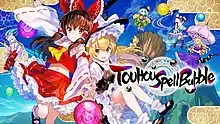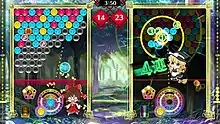Touhou Spell Bubble
Touhou Spell Bubble is a rhythm based competitive arcade puzzle game developed in 2020 by Taito as an officially licensed spin-off in the Touhou Project series. The gameplay is similar to that of the Puzzle Bobble series, which Taito also developed. The company has referred to the game as "Puzzle Bobble meets Touhou Project,"[1] implying that they consider it to also be a spinoff of both series.
| Touhou Spell Bubble | |
|---|---|
 | |
| Developer(s) | Taito |
| Publisher(s) |
|
| Director(s) | Mayu Kikuchi |
| Producer(s) | Tomoyuki Sawada |
| Designer(s) | Hidetake Iyomasa |
| Composer(s) | Yu Shimoda |
| Series | Touhou Project, Puzzle Bobble |
| Platform(s) | Nintendo Switch |
| Release | |
| Genre(s) | Puzzle, rhythm |
| Mode(s) | Single-player, multiplayer |
Gameplay

In Touhou Spell Bubble, the player is given colored bubbles, which they fire from the bottom of the screen onto a pile towards the top. The rate at which the player can fire bubbles corresponds to the tempo of the music.[2] When three bubbles of the same color are connected, they pop, giving the player points. If a large enough group is destroyed, a rhythm microgame will initiate, requiring the player to rhythmically press the button to the song's timeline (seen on both far left and right) to receive further points and send colorless junk bubbles to the opponent.[3]
Touhou Spell Bubble features a story mode told from either Reimu and Marisa's perspectives, both containing 22 levels each. Using visual novel-styled cutscenes and gameplay, it tells the tale of Marisa's newly developed, magically charged game "Spell Bubble" and the ongoing mysteries regarding the upcoming tournament surrounding it.
Characters can be unlocked in story mode, totalling at 20 playable characters upon completion, each of whom has a total of 3 spell cards to choose from, which can be used to destroy bubbles, or impede her opponent's ability to do the same.[4] Matches last for the runtime of the background music, and the player with the most points when the time runs out is declared the winner.[3] The player can also play singular matches, either with the AI, or with human opponents through local or online multiplayer.[3][5] Upon winning or losing matches, the player is given in-game currency based on the overall skill intensity between the opponents of the match, which can be used to purchase new songs and spell cards.[2]
Development
On 23 January 2020, Taito released a gameplay trailer for Touhou Spell Bubble on their YouTube channel, and announced the game's release date.[6] The game was released in Japan through the Nintendo eShop on February 6, 2020,[7] and internationally on October 29.[8] Physical copies were released in Asia in autumn 2020.[9]
The music of Touhou Spell Bubble was used in promotional material, with Taito releasing the names of composers in January 2020.[10] The game features doujin songs including "Bad Apple!!", "Marisa Stole the Precious Thing", "Night of Knights", and "Cirno's Perfect Math Class".[4]
In November 2020, three separate music packs were released as DLC,[11] and side story content was released in DLC exclusive to Japan.[4] In November 2021, online multiplayer was added to the game in a free update.[5]
Reception
| Aggregator | Score |
|---|---|
| Metacritic | 77/100[12] |
| Publication | Score |
|---|---|
| Nintendo Life | 8/10[3] |
| Cubed3 | 8/10[13] |
| Digitally Downloaded | |
| Nintendo Blast | 8.5/10[15] |
| Siliconera | 8/10[4] |
Touhou Spell Bubble received "generally favorable reviews", according to review aggregator Metacritic.[12] Nintendo Life's Pete Davison commended the gameplay, music, and artwork, but criticised the lack of an online multiplayer.[3] Digitally Downloaded's Harvard L. was more critical, stating that "the elegant simplicity of Puzzle Bobble was being tainted", resulting in "a game about instincts rather than planning". He considered both the story and gameplay too difficult to understand, and argued that it was inferior to the original Puzzle Bobble.[14] Siliconera's Jenni Lada gave positive remarks to the "unbelievably satisfying" gameplay, and "amazing" music.[4] Lada later went on to call it one of the best games of 2020.[16]
Nintendo Blast's Juliana Paiva Zapparoli criticized the high retail price due to the use of licensed music and translation issues, stating that the title was better suited for fans of Touhou Project. Nevertheless, Zapparoli gave positive remarks for the gameplay, replay value, game modes, responsive controls, adjustable difficulty, music selection and for being faithful to the source material.[15] Cubed3's Shane Jury felt that the game stands above most puzzle titles on Nintendo Switch for its "brilliant audio collection" and unique take on the Puzzle Bobble system, but criticized the lack of online multiplayer.[13] Touch Arcade's Shaun Musgrave called Touhou Spell Bubble one of the 10 best puzzle games available on Switch, but noted "the only thing it’s missing is an online multiplayer mode, and that is admittedly a big omission given what a blast the local multiplayer mode is."[17]
See also
References
- "Puzzle Bobble meets Touhou Project in a new Rhythmic Puzzle Game for Nintendo Switch! Launches today!". Taito Corporation Blog. Archived from the original on 28 December 2022. Retrieved 28 December 2022.
- Kreinhop, Hunted (February 24, 2021). "Touhou Spell Bubble Review – Poppin Bubbles With Waifus". Noisy Pixel. Archived from the original on 2021-09-20. Retrieved 2021-09-20.
- Davison, Pete (November 4, 2020). "Mini Review: Touhou Spell Bubble - A Puzzle Bobble Sequel In All But Name - Taito hops onto the Touhou Project". Nintendo Life. Nlife Media. Archived from the original on 2021-10-31. Retrieved 2021-09-20.
- Lada, Jenni (November 13, 2020). "Review: Touhou Spell Bubble Pops". Siliconera. Enthusiast Gaming. Archived from the original on 2022-07-13. Retrieved 2021-09-20.
- Lada, Jenni (2021-11-18). "Touhou Spell Bubble Online Multiplayer Added in Free Update". Siliconera. Archived from the original on 2021-11-23. Retrieved 2021-11-23.
- "Touhou Spell Bubble Puzzle Game's Videos Preview 12 New Songs". Anime News Network. Archived from the original on 2021-05-22. Retrieved 2021-05-22.
- Romano, Sal (2020-01-23). "Touhou Spell Bubble launches February 6 in Japan". Gematsu. Archived from the original on 2021-05-22. Retrieved 2021-05-22.
- "Touhou Spell Bubble Launches Outside Japan". Siliconera. 2020-10-29. Archived from the original on 2021-05-22. Retrieved 2021-05-22.
- Wong, Alistair (2020-07-30). "Touhou Spell Bubble Physical Copies in Asia Will Include English Subtitles". Siliconera. Archived from the original on 2021-05-22. Retrieved 2021-05-22.
- "Puzzle Bobble Crossover Fangame Touhou Spell Bubble By Taito Releases in Japan on February 6, 2020". Siliconera. 2020-01-23. Archived from the original on 2021-05-22. Retrieved 2021-05-22.
- Nguyen, Lisa (2020-11-04). "Touhou Spell Bubble Now Available On The Nintendo Switch eShop | Happy Gamer". HappyGamer. Archived from the original on 2021-06-24. Retrieved 2021-05-22.
- "Touhou Spell Bubble for Switch Reviews". Metacritic. Red Ventures. October 29, 2020. Archived from the original on 2022-01-08. Retrieved 2021-09-20.
- Jury, Shane (January 8, 2021). "Touhou Spell Bubble (Nintendo Switch) Review". Cubed3. Cubed3 Limited. Archived from the original on 2021-08-05. Retrieved 2021-09-20.
- L., Harvard (November 13, 2020). "Review: Touhou Spell Bubble (Nintendo Switch)". Digitally Downloaded. Digitally Downloaded Media Australia. Archived from the original on 2021-09-23. Retrieved 2021-09-20.
- Zapparoli, Juliana Paiva (December 13, 2020). "Análise: Touhou Spell Bubble (Switch) é uma aventura rítmica em Gensokyo". Nintendo Blast. GameBlast. Archived from the original on 2021-09-20. Retrieved 2021-09-20.
- Lada, Jenni (December 25, 2020). "Best 2020 Games You Might Have Missed". Siliconera. Enthusiast Gaming. Archived from the original on 2021-10-26. Retrieved 2021-09-20.
- Musgrave, Shaun (July 2, 2021). "The 10 Best Puzzle Games on Nintendo Switch: SwitchArcade Special Edition". TouchArcade. Archived from the original on 2021-09-26. Retrieved 2021-09-20.